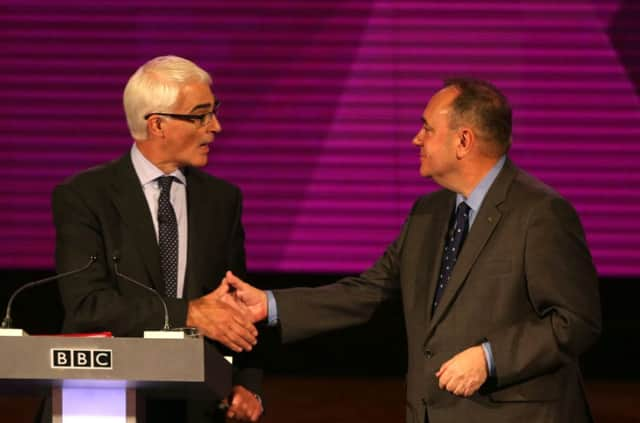Bill Jamieson: Quiet voters had their say


Searching questions must be asked of the broadcast media on the gap between the coverage of Scotland’s independence referendum and its outcome.
For months TV studio debates portrayed this, at best, as a knife-edge contest and one with the Yes campaign not just in the ascendant but a voluble, unstoppable, dominating majority.
Advertisement
Hide AdAdvertisement
Hide AdWhat emerged in the early hours of Friday morning was the emphatic dominance of another Scotland, undemonstrative in its manner, reserved in its opinion.
It’s tempting to see Scotland as a nation quick to come forward, that wears its heart on its sleeve and declaims its views forthrightly and with passion.
But there is another Scotland that has always been with us: reticent, reserved and altogether more circumspect when it comes to airing views. No posters in their windows or flags in their gardens or stickers on their cars. But their views are held as deeply and count just as much. Across the Channel there is a phenomenon known as “La France profonde” – that quiet, undemonstrative rural France that does not honk its car horns or tear up the cobbles from the streets of Paris.
What we saw emerging in the early hours of Friday morning was the “Caledonia profonde”: the folk to whom no microphone was held or camera pointed.
It’s understandable, from a media view, that this Scotland did not fill many seats at these angry, shouty TV encounters. Programme planners may have thought they were getting “typical Scots”. Typical of a type, perhaps. But, as the 55–45 per cent result showed, certainly not representative of Scotland.
As for the campaign, I felt from the start that the concerns of business were woefully under-represented.
When the worries over currency, regulatory costs and European Union membership did surface, they were as often as not dismissed as irrelevant or exaggerated, or “scaremongering”. “Yes” just didn’t want to hear.
Advertisement
Hide AdAdvertisement
Hide AdYet as the polls narrowed, it was clear business was starting to notice a deferral of investment and expansion plans and many firms, particularly in the financial sector, were indeed planning to move their headquarters out of Scotland. This was no “bluff and bluster”.
Now media commentary is focused on new constitutional arrangements and federal structures for the United Kingdom. But the outstanding feature of the referendum result was the strength of the “Yes” vote areas of high long-term unemployment, urban decay and social deprivation – Glasgow, Dundee and West Dunbartonshire. The problem to address now surely is as much socio-economic in nature as about constitutional architecture.
Finally, did Alex Salmond really lose? He inspired a massive outpouring of passion and a degree of political engagement not seen in Scotland since 1945.
Even among the ranks of seen-it-all-before media folk who thronged the central count at Ingliston, news of voter turnouts of up to 91 per cent were met with gasps of astonishment. And he has kickstarted a movement that could lead to constitutional change across the UK greater than any politician in living memory has achieved.
Alex Salmond has put a federal Britain on the agenda. And in this he may well have wrought a change, not just in how Scotland but the whole of the UK is governed.
The immediate result of his referendum is a political defeat. But I suspect history may come to record a rather different verdict on the legacy of Alex Salmond.